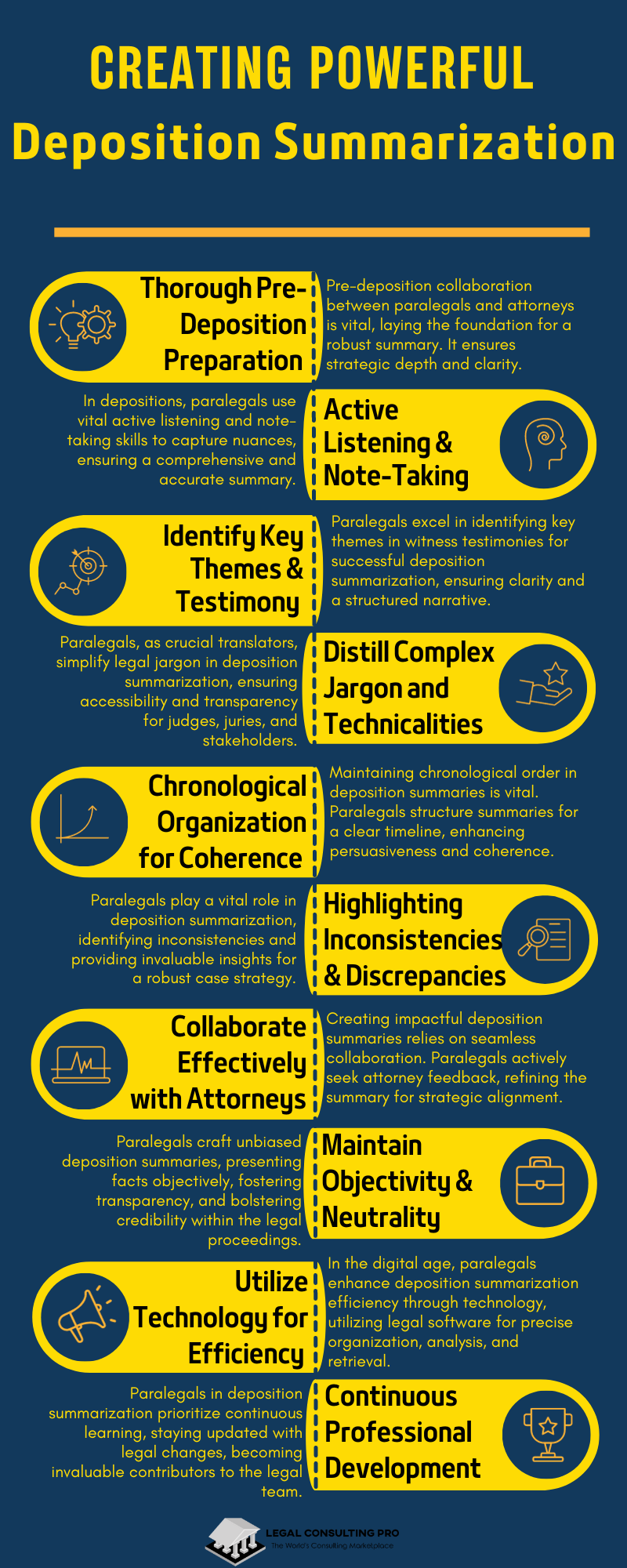Deposition summarization is a crucial aspect of legal proceedings, playing a pivotal role in building a strong case. Paralegal services often find themselves at the forefront of this task, tasked with distilling complex testimonies into concise and impactful summaries. In this article, we delve into the art of creating powerful deposition summaries, providing valuable tips to help paralegals navigate this intricate process effectively.
Understanding the Importance of Deposition Summarization
Before embarking on the journey of crafting impactful deposition summaries, it is crucial to comprehend the profound significance that this task holds within the realm of legal proceedings. Depositions, regarded as a cornerstone of the legal process, serve as a primary wellspring of evidence, capturing the firsthand testimonies of witnesses under the solemnity of an oath.
Summarizing depositions is not merely a procedural step; it is an essential act of translation and transformation. Legal professionals must extract critical details from the vast pool of information, chiseling away the superfluous to reveal the core elements that will fortify their case. This process goes beyond mere condensation; it involves the discerning eye of legal expertise to identify the pivotal components that will contribute to the narrative presented during the trial.
In essence, the involvement of paralegal services in deposition summarization is akin to having skilled navigators steering the ship through treacherous legal waters. Their contribution goes beyond the mechanical aspects of compiling information; it extends to shaping the narrative, identifying the nuances that can sway the course of a case, and presenting a synthesized version that resonates with legal strategy.
Tip 1: Thorough Pre-Deposition Preparation
The cornerstone of a robust deposition summary is established in the pre-deposition phase. Close collaboration between paralegals and attorneys is paramount, delving into case intricacies, identifying key issues, and outlining the necessary information from witnesses. A thorough pre-deposition preparation is the bedrock, ensuring the ensuing summary captures pivotal details capable of steering the case’s trajectory. This collaborative groundwork not only sharpens the focus on critical elements but also establishes a strategic framework, enriching the subsequent deposition summary with the depth and clarity required to navigate the complexities of legal proceedings effectively.
Tip 2: Active Listening and Note-Taking Skills
In the crucible of deposition, paralegals wield indispensable active listening and note-taking skills. These proficiencies are paramount for capturing nuanced tones and unexpected revelations within witness testimonies. Through meticulous annotation of relevant details, paralegals not only ensure a comprehensive and accurate representation of the summary but also bolster the legal team’s profound understanding of the case. The ability to discern subtleties and unveil unforeseen elements during depositions elevates the summary from a mere compilation to a nuanced narrative, providing a crucial foundation for strategic decision-making and enhancing the overall effectiveness of the legal team in the unfolding legal proceedings.
Tip 3: Identify Key Themes and Testimony Patterns
Achieving successful deposition summarization requires paralegals to adeptly identify key themes and patterns within witness testimonies. Their skill lies in recognizing recurring elements, pinpointing inconsistencies, and identifying pivotal moments that hold significant sway over the case’s outcome. Through meticulous categorization based on these discerned themes, the resulting summary acquires a clear and structured narrative. This strategic organization not only streamlines information but also lays the foundation for a more compelling and coherent presentation in the courtroom. Paralegals, as astute orchestrators of information, contribute to shaping a narrative that resonates effectively, enhancing the overall persuasive impact of the legal team.
Tip 4: Distill Complex Jargon and Technicalities
In legal proceedings, intricate jargon and technical intricacies can pose comprehension challenges for judges and juries. Paralegals engaged in deposition summarization become crucial translators, possessing the skill to distill these complexities into easily understandable language. This adept simplification ensures that the essence of the testimony is not lost in translation, maintaining accessibility for all stakeholders involved in the case. By bridging the gap between legal intricacies and lay understanding, paralegals contribute to a transparent and comprehensible deposition summary, facilitating a more inclusive and informed legal discourse that aligns with the diverse perspectives of those involved in the judicial process.
Tip 5: Chronological Organization for Coherence
Ensuring coherence in deposition summaries hinges on the pivotal aspect of maintaining chronological order. Paralegal services providers entrusted with this task play a key role in structuring the summary to mirror the sequential unfolding of events during the deposition. This strategic chronological organization becomes an invaluable asset for attorneys, providing a clear and logical timeline of events during trial presentations. The resulting clarity not only enhances the persuasiveness of the case but also allows legal professionals to effectively navigate through the intricacies of the testimony, presenting a compelling narrative that resonates with the courtroom audience and bolsters the overall strength of the legal argument.
Tip 6: Highlighting Inconsistencies and Discrepancies
Integral to the paralegal’s role in deposition summarization is the discerning task of identifying inconsistencies or discrepancies within witness testimonies. Meticulously highlighting these nuances provides the legal team with invaluable insights, uncovering potential weak points or areas necessitating further investigation. This acute attention to detail assumes a pivotal role in constructing a robust case strategy. By unveiling subtle inconsistencies, paralegal services providers contribute to the strategic fortification of the legal team’s position, empowering attorneys with the knowledge needed to address vulnerabilities, anticipate challenges, and ultimately craft a compelling and resilient narrative for presentation in the legal arena.
Tip 7: Collaborate Effectively with Attorneys
The creation of impactful deposition summaries hinges on the seamless collaboration between paralegals and attorneys. Essential to this dynamic is open communication, fostering a shared understanding of the case’s intricate nuances. Paralegal services providers play a proactive role by actively seeking feedback from attorneys, creating a feedback loop that refines and enhances the summary. This iterative process ensures the alignment of the summary with the overarching legal strategy. By maintaining transparent communication channels and embracing a collaborative approach, paralegals contribute significantly to the development of a deposition summary that not only captures critical details but also aligns seamlessly with the strategic goals of the legal team.
Tip 8: Maintain Objectivity and Neutrality
In the endeavor to craft impactful deposition summaries, paralegals are entrusted with the imperative duty of maintaining objectivity and neutrality. The summary becomes a canvas where facts are presented devoid of bias, enabling the legal team to make informed decisions based on unadulterated information. This commitment to impartiality not only fosters transparency but also significantly contributes to the credibility of both the paralegal and the overarching legal proceedings. By upholding a stance of neutrality, paralegals fortify the foundation of trust upon which the legal narrative is built, ensuring that the summary stands as a reliable and unbiased testament in the pursuit of justice.
Tip 9: Utilize Technology for Efficiency
In the digital era, paralegals can amplify the efficiency of deposition summarization through adept use of technology. Proficiency in legal software and tools becomes paramount, empowering paralegals to organize and analyze deposition transcripts with precision. This technological integration not only streamlines the summarization process but also affords the capability for swift retrieval of specific details as and when required. By harnessing the power of digital tools, paralegals enhance their capacity to navigate the intricacies of large datasets, ensuring a more agile and accurate approach to deposition summarization. This synergy between legal and paralegal services expertise and technological prowess is instrumental in elevating the effectiveness of the summarization process.
Tip 10: Continuous Professional Development
Within the dynamic tapestry of the legal landscape, paralegals involved in deposition summarization must prioritize continuous professional development. As regulations and precedents evolve, staying abreast of these changes is paramount. This commitment to ongoing learning ensures that paralegals remain equipped with the latest insights and skills, becoming valuable contributors to the overall success of the legal team. By embracing a proactive approach to professional development, paralegals not only navigate the ever-shifting legal terrain effectively but also position themselves as indispensable assets, capable of offering nuanced expertise that aligns seamlessly with the evolving demands of the legal profession.

3 Key Scenarios Where Deposition Summaries Gave Lawyers An Edge
Utilize Summaries for Medical Causation Clarity
I am an attorney with substantial experience in workers’ compensation litigation. I have represented employees, employers, and insurers in workers’ compensation cases since 2016. I currently run a solo practice, primarily representing employees in workers’ compensation litigation.
Workers’ compensation cases often involve medical causation disputes with competing expert medical opinions. Judges often adopt the medical opinion of the doctor who has the most complete and accurate set of information. I routinely cut and paste deposition summaries into my foundational letter to the medical expert witness. I then introduce the foundational letter as an exhibit at the hearing. If there is a claim that my expert did not have some piece of information that was discussed during the deposition (which is common), the deposition summary within the foundational letter will refute that claim.
Luke Smith, Attorney and Founder, LawSmith PLLC
Streamline Trial Prep with Witness Summaries
Deposition summaries prove invaluable in various scenarios, but one straightforward example highlights their unquestionable advantage. Imagine a personal injury case where multiple witnesses provide testimony during depositions. Compiling detailed summaries of these depositions streamlines the process of reviewing and analyzing the witness statements.
This condensed format allows me to quickly grasp key points, identify inconsistencies, and pinpoint crucial evidence supporting our case. Deposition summaries enhance efficiency during trial preparation, enabling me to focus on crafting compelling legal arguments and strategies.
Moreover, these summaries facilitate effective communication with clients, providing clear insights into the testimony presented. By leveraging deposition summaries, I can effectively advocate for our clients’ rights, navigate the complexities of injury law, and secure favorable outcomes in personal injury cases. At Garnett Patterson Injury Lawyers, we prioritize the strategic use of deposition summaries to strengthen our legal representation and deliver exceptional results for our clients.
Hunter Garnett, Personal Injury Lawyer and Managing Partner, Decatur Personal Injury Lawyers
Case Strategy Preparation
In my legal practice, I’ve discovered a game-changing advantage of using Deposition Summaries, especially in intricate litigation scenarios. Picture this: You’re gearing up for a trial, buried under mountains of deposition transcripts. Here’s where the magic happens. Deposition Summaries condense all that dense information into bite-sized chunks, highlighting the critical details and cutting through the clutter. This not only saves me invaluable time but also sharpens my focus on key witness testimonies and case strategies. With Deposition Summaries as my secret weapon, I navigate through complex legal terrain with precision and confidence, giving my clients a winning edge.
Jonathan Rosenfeld, Owner and Attorney, Rosenfeld Injury Lawyers
Conclusion
In the realm of legal proceedings and paralegal services, deposition summarization stands as a critical bridge between raw witness testimonies and a compelling case presentation. Paralegal services, armed with a keen understanding of legal intricacies and the tips provided in this article, play a pivotal role in crafting powerful deposition summaries. By embracing active listening, meticulous organization, and technological advancements, paralegals can elevate their contribution to the legal team, ultimately profoundly influencing the outcome of cases. As the legal landscape continues to evolve, the role of paralegals in deposition summarization remains indispensable, ensuring that justice is served with precision and clarity.
Similar Blogs:
Deposition Summarization for Specialized Areas of Law: Tailoring Summaries to Your Practice
Video Deposition Summarization: Enhancing Access to Crucial Testimony







































